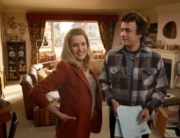Exploring a long, close friendship through its inevitable peaks and valleys, The Eight Mountains is the thoughtful if overlong new film by the Belgian codirectors/cowriters Felix van Groeningen (The Broken Circle Breakdown) and Charlotte Vandermeersch. Since their film (which is based on the 2016 novel by Italian writer Paolo Cognetti) has a title that’s both metaphorical and literal, Groeningen and Vandermeersch sometimes find themselves caught uneasily between those two worlds.
The Eight Mountains traces the friendship between Pietro and Bruno from childhood until adulthood. In 1984, 11-year-old Pietro and his parents leave Turin for a remote Alpine valley during the summer, where the middle-class boy befriends young Bruno, who lives with his father on a farm at the base of the mountains. The young pair are soon inseparable, often horsing around in the lovely landscape—the exquisite but not overly pretty cinematography is by Ruben Impens, shooting in the nearly square Academy ratio that emphasizes the intimacy within the expansiveness.
Pietro’s father, Giovanni (Filippo Timi), loves climbing the mountain paths and glacier faces. After Pietro refuses to jump over a crevice in the glacier—his dad and Bruno have already done so—his relationship with his father becomes strained. (One might also say that using this fissure as a metaphor for their relationship is also strained.) After Bruno’s dad refuses to allow his son to live with Pietro’s family in Turin to attend high school, the boys end up losing touch for 15 years. When they finally reconnect in their early thirties, Pietro, now curious and worldly, has begun a fledgling career as a writer, while Bruno has become even more insular, still working the fields surrounded by the Italian Alps.
The pace is slow and methodical, though the early sequences of the boys bonding in the summer move quickly, just like childhood, then, as they grow older and have to shoulder more responsibility, the tone turns more elegiac. Pietro’s occasional narration (mirroring Cognetti’s novel) is complemented somewhat heavy-handedly with songs by Swedish singer Daniel Norgren, which combine to fill in the spaces of the story and characters. Often, though, they seem like shortcuts instead of providing further illumination.
It’s more than noticeable that the story line is schematic: Pietro is a city boy. Bruno is a country bumpkin, and the two follow divergent, rigidly defined paths. Meanwhile, when they are adults, the women in the men’s lives—Pietro’s mother (Elena Lietti); Asmi (Surakshya Panta), whom Pietro falls in love with while traveling in Nepal; and Bruno’s girlfriend, Lara (Elisabetta Mazzullo)—are only cursorily sketched.
But all of this is secondary to how the directors burrow into these men’s emotional journeys, together and apart. The quartet of actors playing Pietro and Bruno as youths and teenagers is wonderfully authentic. As adults, Luca Marinelli (Pietro) and Alessandro Borghi (Bruno) are unimpeachable, finding endless depths in the men through the slightest gesture or even in a moment of silence.
When, late in the film, Pietro discovers that Bruno and his estranged father had become quite close—climbing and hiking through the mountains together over many years—it’s the most poignant moment. Pietro says, with wistful regret, “I had two fathers—my city father and my mountain father.” That realization prods him to rekindle his strained (that word again) friendship with Bruno, who has, conversely, become more walled off from those dearest to him.
The understated, bittersweet ending of the ultimately moving The Eight Mountains underscores the difficulties navigating life’s pathways, even for those who wandered them together.

















Leave A Comment